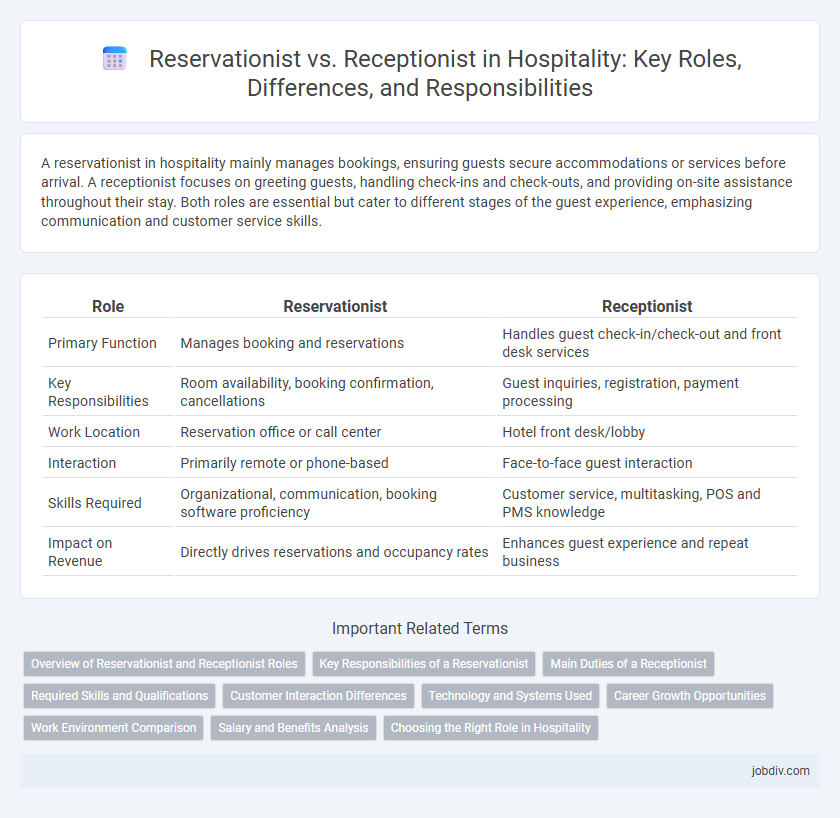A reservationist in hospitality mainly manages bookings, ensuring guests secure accommodations or services before arrival. A receptionist focuses on greeting guests, handling check-ins and check-outs, and providing on-site assistance throughout their stay. Both roles are essential but cater to different stages of the guest experience, emphasizing communication and customer service skills.
Table of Comparison
| Role | Reservationist | Receptionist |
|---|---|---|
| Primary Function | Manages booking and reservations | Handles guest check-in/check-out and front desk services |
| Key Responsibilities | Room availability, booking confirmation, cancellations | Guest inquiries, registration, payment processing |
| Work Location | Reservation office or call center | Hotel front desk/lobby |
| Interaction | Primarily remote or phone-based | Face-to-face guest interaction |
| Skills Required | Organizational, communication, booking software proficiency | Customer service, multitasking, POS and PMS knowledge |
| Impact on Revenue | Directly drives reservations and occupancy rates | Enhances guest experience and repeat business |
Overview of Reservationist and Receptionist Roles
Reservationists specialize in managing bookings, handling customer inquiries, and coordinating room availability through reservation systems to optimize occupancy rates. Receptionists serve as the frontline representatives, managing check-ins and check-outs, directing guests, and handling front desk operations to ensure smooth daily hospitality functions. Both roles require excellent communication skills and customer service expertise but focus on distinct aspects of guest interaction within the hospitality industry.
Key Responsibilities of a Reservationist
A Reservationist in hospitality primarily manages booking inquiries, processes reservations through property management systems, and maintains accurate records of room availability to optimize occupancy rates. Their responsibilities include handling customer requests, confirming bookings, and coordinating special accommodations to enhance guest satisfaction. Unlike receptionists, reservationists focus on pre-arrival engagement, ensuring seamless reservation workflows that contribute to efficient front desk operations.
Main Duties of a Receptionist
A receptionist in hospitality primarily manages guest check-ins and check-outs, ensuring smooth and efficient front desk operations. They handle reservations, answer inquiries, direct guests to services, and maintain accurate records of room availability. Their role is essential for providing excellent customer service and creating a welcoming atmosphere in hotels and resorts.
Required Skills and Qualifications
Reservationists require strong organizational skills, proficiency in reservation software, and excellent communication abilities to manage bookings and guest inquiries efficiently. Receptionists must possess exceptional interpersonal skills, multitasking capabilities, and a thorough knowledge of front desk operations, including handling check-ins, check-outs, and guest services. Both roles demand attention to detail, problem-solving skills, and a customer-oriented approach to enhance the overall guest experience in the hospitality industry.
Customer Interaction Differences
Reservationists specialize in managing bookings and providing detailed information about availability, rates, and policies, ensuring a smooth pre-arrival experience for guests. Receptionists focus on front-desk operations, handling check-ins, check-outs, and addressing immediate guest needs during their stay, offering personalized assistance and problem resolution. The distinction in customer interaction lies in the reservationist's proactive communication before arrival versus the receptionist's reactive support during the guest's visit.
Technology and Systems Used
Reservationists primarily utilize property management systems (PMS) and online booking platforms to efficiently manage room availability, rates, and guest preferences. Receptionists often work with front desk software integrated with PMS, enabling real-time check-in/check-out processes, guest service management, and payment processing. Both roles increasingly rely on customer relationship management (CRM) tools to enhance personalized guest experiences and streamline communication workflows.
Career Growth Opportunities
Reservationists in hospitality focus on booking management and customer inquiries, offering specialized skills that can lead to roles in revenue management, sales coordination, or reservation system training. Receptionists handle front-desk operations, guest services, and check-in/out processes, providing a versatile foundation for advancement into front office management, guest relations, or concierge positions. Both roles serve as critical entry points, but reservationists typically advance toward specialized operational roles while receptionists have broader opportunities in guest experience leadership.
Work Environment Comparison
Reservationists primarily operate in call centers or back-office settings handling booking systems remotely, while receptionists work on-site at the front desk, directly engaging with guests and managing face-to-face interactions. Reservationists rely heavily on computer-based reservation software and telecommunication tools, whereas receptionists balance administrative tasks with personal customer service in dynamic, often high-traffic environments. The work environment for reservationists tends to be more structured and stationary, contrasting with the fast-paced, multitasking demands frequently encountered by receptionists in hospitality venues.
Salary and Benefits Analysis
Reservationists in hospitality typically earn an average salary ranging from $28,000 to $38,000 annually, reflecting their specialized role in managing bookings and reservations. Receptionists, with a broader range of front-desk responsibilities, often receive a slightly higher average salary between $30,000 and $40,000 per year, complemented by benefits such as health insurance, paid time off, and employee discounts. Benefits packages for both roles frequently include access to wellness programs and opportunities for career advancement, with variations depending on the size and type of establishment.
Choosing the Right Role in Hospitality
Choosing between a reservationist and a receptionist in hospitality hinges on specific operational needs; reservationists specialize in managing bookings and optimizing room inventory, directly impacting revenue management and guest satisfaction. Receptionists handle front desk duties including check-ins, guest inquiries, and coordinating with other hotel departments, ensuring smooth daily operations and personalized guest experiences. Aligning the role with targeted responsibilities enhances efficiency, guest engagement, and overall service quality in hospitality management.
Reservationist vs Receptionist Infographic

 jobdiv.com
jobdiv.com